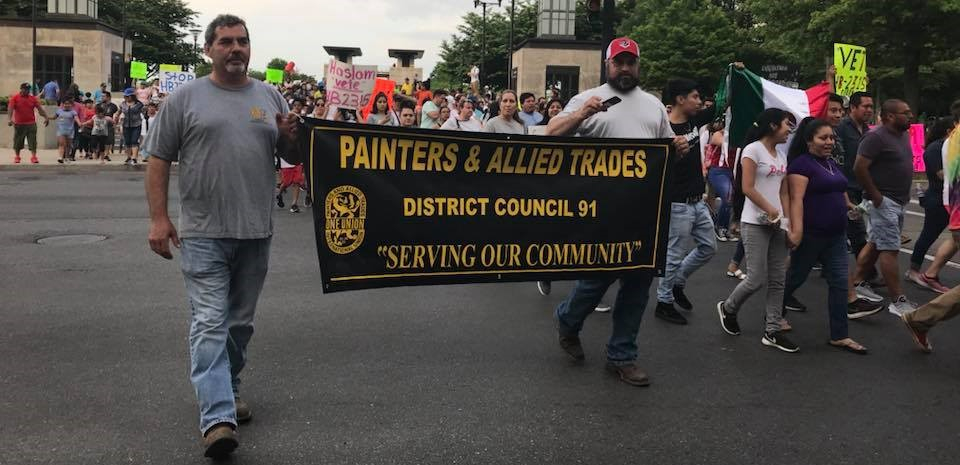Nashville Painters Aim To Build Immigrant Base

Nashville Painters marched to demand that Governor Haslam veto a bill banning sanctuary cities. Credit: Alianza Laboral Worker Resource Center.
How can building trades unions organize workers in an area where they don’t have much of a foothold? You’ve got to become a fixture in the community, and be in it for the long haul.
That’s the commitment the Painters are making in Nashville, Tennessee, where they just launched the Alianza Laboral (Spanish for “labor alliance”) Worker Resource Center.
Local 456 is small. Most of its 100 members work for contractors with the Tennessee Valley Authority, the federal agency that provides electricity and manages water resources throughout the region, or in auto plants or other industrial jobs. The local doesn’t have its own union hall.
But Nashville is a boom town. “You look out over the skyline and you see cranes everywhere,” said shop steward Mary Jo Parker.
Parker is on her first commercial job, after four years at an auto plant and the TVA. She’s working six days a week to paint the 33-story J.W. Marriott Hotel, set to open in July.
The Marriott aside, most construction work in Nashville is being done nonunion, overwhelmingly by Latino immigrants. To raise standards in the industry, the union will have to organize these workers.
Neidi Dominguez sees that as a long-term project. “In a place like Nashville, we’re not going to win going general contractor to general contractor.”
Dominguez is director of the Painters’ new strategic organizing division, established last summer.
“Right now, we don’t have the power to initiate a fight against anyone,” she said. “What’s most important to us is the way we establish ourselves within the Latino community, to one day be ready to take on those fights.”
A SPACE OF THEIR OWN
For starters, the new resource center is located in southeast Nashville, where many of the city’s Latinos live. The goal is to create “a culturally more welcoming space,” Dominguez said, where workers can mingle off the job and get to know one another.
“We want it to be a space that is open to the community for parties, events—what union halls used to be,” she says.

SUPPORT LABOR NOTES
BECOME A MONTHLY DONOR
Give $10 a month or more and get our "Fight the Boss, Build the Union" T-shirt.
The union is recruiting local construction workers as affiliate members. They pay $24 a year in dues. Community members and students can also join.
The low dues don’t get them on the hiring hall list, though they may be sent to union jobs if there’s a need. “The rap we’ve had for decades about how you get a worker to join us no longer works,” says Dominguez. “If we lead by saying, ‘If you join us, you can have a good job,’ we have no jobs to offer them.”
José Alvarez signed up as an affiliate member. He’s been painting homes and apartments in Nashville for two years, after eight years painting ships in Louisiana and bridges in North Carolina.
One motivation for joining, Alvarez says, is wage theft. “It’s not easy to live as an immigrant here,” he says. “Many times we run into people who don’t pay us. There are a lot of people who take advantage of workers.”
For instance, Alvarez got injured when he fell off a ladder while painting a North Carolina bridge at night. The boss initially refused to pay for his medication or even for his hours worked until he and his co-workers banded together. After the incident, he was no longer hired by the company. He hopes the union will be a place where workers can get help—and help one another—to navigate problems like that.
The Painters’ new strategic organizing division has also launched campaigns in Atlanta and Houston, as the union seeks to build more of a presence in the South, and in Denver.
SAFETY FIRST
The first events at the newly open center were OSHA 10 trainings—the basic 10-hour course in health and safety, conducted in Spanish and co-hosted by the Laborers. In the past two years, 16 Nashville construction workers have been killed on the job.
The union also organized a training on how to prepare if Immigration and Customs Enforcement shows up at the worksite. The training came in the wake of an ICE raid on a slaughterhouse in east Tennessee on April 5. Ninety-seven workers were arrested, in the largest workplace raid in the U.S. in a decade.
The training stressed that an employer can deny entrance to ICE agents unless they have a warrant from a judge. “But the general contractor is not going to refuse to let ICE in unless we’re organizing and having these conversations with the boss,” said Rosa Ponce, a Painters organizer in Nashville.
Parker and a handful of other union members attended the center’s grand opening in March. “We had a great crowd, several speakers, a live band, we had food,” said Parker. “There’s a language barrier, but we have interpreters, so we can all be together.”
“If this is where the workforce is growing, either we’re going to talk to them or the employer’s going to talk to them,” said Painters organizer Rosa Lozano.





